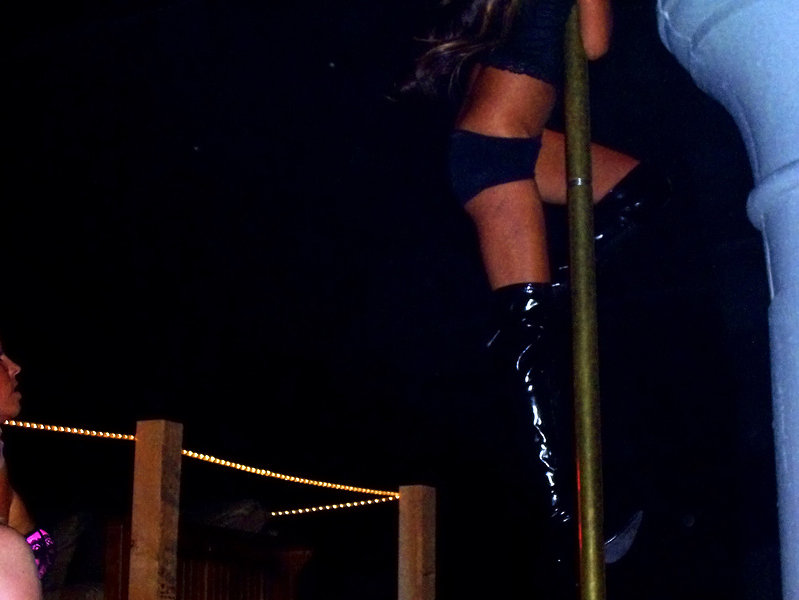"Bar Month" at OnMilwaukee.com is back for another round! The whole month of February, we're serving up intoxicatingly fun articles on bars and clubs -- including guides, the latest trends, bartender profiles and more. Grab a designated driver and dive in!
Obviously, "Destiny" isn't her real name, and technically, she's an ex-stripper, having left the business a few months ago after working at Encore Gentlemen's Club, 101 S. Dana Court, for a decade. But Destiny has some stories to tell and a new non-stripper job, so using her real name wasn't really an option.
Destiny was one of those exotic dancers who actually used the money she earned to work her way through college. She isn't, and never was, a drug addict. She wasn't abused as a child. In fact, as we discussed her career over lunch, she found herself apologizing because her experience just wasn't that scandalous.
Still, being OnMilwaukee.com Bar Month, Destiny provided an inside look into an entirely different kind of bar business. Here's her story.
OnMilwaukee.com: Where have you danced?
Destiny: I started out at Art's Performing Center, then I moved to The Encore. I also briefly worked at Airport Lounge. I started in 2000 and stopped last year, because I graduated from college.
OMC: So, you were actually putting yourself through college by stripping?
Destiny: I truly was.
OMC: How much were you making?
Destiny: Back in 2000, it was a lot better. As everything has gone down with the economy, strip clubs have been hit kind of hard. Lawyers and businessmen would still tip well, but an average night was $150. The most I made was $500 a night.
OMC: That's it? I thought strippers made $2,000 a night.
Destiny: It was a small club, and toward the end I was working more day shifts. We paid to rent out the stage, and it has happened to some people where they could work and not make any money. It's part of the deal, but it was so rare that it was that dead that you wouldn't walk away with at least $100.
OMC: Did your regulars ever think that you were actually attracted to them?
Destiny: I think some of them did. It became part of the routine that they would stop in after work or later in the evening. When they sit and talk with a girl over and over again, they do feel like it is some sort of relationship. Maybe not a girlfriend, especially if they did have someone else in their life at home, but they made me very sad. I could tell I was such a big part of their life and they didn't have anyone else.
OMC: So how did you distance yourself from this act? Your job is to make money from them, but you said it made you sad.
Destiny: It's a fine line. It was hard. They were generally coming by themselves.
OMC: Did you ever drop the act and befriend these guys?
Destiny: Yeah, and that's one of my faults. I did get too involved at times where I would talk to them on the phone.
OMC: You gave them your phone number?
Destiny: Yeah, especially at the smaller clubs, it does become more like family or more like good friends. You don't have to worry that they're going to do anything or that they're going to harm you. It's hard to describe, because it does sound so strange. In my case it was different, because I worked there for so long, for so many years, than if I just started. Obviously, you're not going to give them your phone number the first night you meet them.
OMC: Did you tell them your real name?
Destiny: Yes.
OMC: Did it ever get romantic?
Destiny: No. My fiance told me he would not get engaged with me until I was done dancing.
OMC: But were you were already a dancer when you met him?
Destiny: Yes.
OMC: Was he cool with that?
Destiny: No. At first he was OK with it because he also works in a bar, but it wore on him pretty fast. Which is a good sign. Someone really cares about you if they want you to get out of that.
OMC: Did any part of you like being a stripper?
Destiny: Yes, it's an extremely easy job. You dance but once an hour, then you sit down and socialize and have a few cocktails. It's a lot of fun.
Destiny: I think anyone who says that they don't like the attention is lying. Everyone likes to get compliments. There are days that you feel like you don't look as good as others, so that can be hard, but overall, the attention was good to get.
OMC: How shady was being a stripper? Were people propositioning you for sex?
Destiny: A few times, but I worked in smaller clubs. If people are after that, they'll go to one of the bigger clubs that's known for that.
OMC: Are there clubs in Milwaukee that are known for that?
Destiny: Yes. I don't entirely know, but I would assume so.
OMC: What about drugs? Is that a big part of the culture?
Destiny: I've never done drugs. I'm lucky I started when I was under 21, because otherwise maybe I would've been swayed. But I was stone-cold sober, but I saw them when I first started, and they're in other businesses, too. It's not nearly as prevalent as you think.
OMC: Were you given restrictions on what's allowed and what isn't, or was it at your discretion?
Destiny: All the clubs I worked at, we kind of joked and called them "Disney" clubs. They were very PG-13. In Milwaukee, you're not allowed to be nude. You're allowed to be topless, but you have to wear latex over your nipples. There's no contact. It's pretty tame.
OMC: Would you have worked somewhere where that wasn't the case?
Destiny: No. I wouldn't want to grind on someone. Some (dancers) came from other clubs and had a hard time adjusting. If someone came in and kept breaking rules, they'd be suspended for a week or fired.
OMC: There are people who think that strip clubs objectify women, but it sounds like you're saying that it's the other way around.
Destiny: I'd agree with that statement. The women that are threatened by their husband or their significant other going to strip clubs, really shouldn't be. They're more likely to meet someone at a corner bar or a bar Downtown than they are in a strip club.
OMC: Do you tell people that you used to be a stripper?
Destiny: I try to hide it, but it's hard because I did it for so long. Searching for a job, it is on my resume, but listed as a cocktail server.
OMC: Do people assume that you were abused as a child or have other deep-seated issues?
Destiny: I've never heard that, but people do judge you more harshly than if you were a cocktail server. Really, there's not much of a difference than working in a bar.
OMC: Do you find it degrading at all when guys throw money at you?
Destiny: Making it rain? Yeah, it does get to be kind of degrading because you have to bend over and pick it all up, but at the same time, it's money. If you think about what some people do for money, they shovel crap at the zoo. There are some bad jobs out there, and they would love to just be bending over and picking up a pile of money or un-crumpling up bills. There are those who love what they do, but those are pretty few and far between right now.
OMC: Considering how much strippers must drink during a shift, are your cocktails watered down?
Destiny: No, I think they're stronger. But people get suspended for drinking. I tried to limit myself, especially when I was going to school, because I couldn't go home hammered and write a paper.
OMC: Have you been to a strip club since you retired?
Destiny: Yeah. I'm still friends with people who work there. It's more expensive when you don't have to work. But it's nice to be able to get up and leave and not have to stay for seven hours.
OMC: Is there such a thing as stripper perfume?
Destiny: It's just a mixture of body sprays and perfumes.
OMC: Is using the word "stripper" offensive to you?
Destiny: I don't really care, but I'm laid back on that. Some people do prefer "performer" or "exotic dancer."
OMC: Where did you buy your stripper clothes?
Destiny: All over, and that's another myth, that people think the club provides that for you. A lot of it is expensive.
OMC: How did you remain convincing to dance in front of people that you, how shall I say, wouldn't normally dance in front of?
Destiny: I think that's in any customer service job. You're going to run into people that smell. Just kill them kindness. Grin and bear and smile.
Andy is the president, publisher and founder of OnMilwaukee. He returned to Milwaukee in 1996 after living on the East Coast for nine years, where he wrote for The Dallas Morning News Washington Bureau and worked in the White House Office of Communications. He was also Associate Editor of The GW Hatchet, his college newspaper at The George Washington University.
Before launching OnMilwaukee.com in 1998 at age 23, he worked in public relations for two Milwaukee firms, most of the time daydreaming about starting his own publication.
Hobbies include running when he finds the time, fixing the rust on his '75 MGB, mowing the lawn at his cottage in the Northwoods, and making an annual pilgrimage to Phoenix for Brewers Spring Training.



